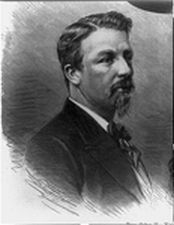Gaston, Count of Eu: Difference between revisions
No edit summary |
No edit summary |
||
| Line 10: | Line 10: | ||
'''Louis Philippe Marie Ferdinand Gaston d'Orléans, Prince Imperial-Consort of Brazil, Count d'Eu''' ([[28 April]][[1842]]-[[28 August]][[1922]]) was the eldest son of [[Louis Charles Philippe Raphael, duc de Nemours]] and [[Victoria of Saxe-Coburg-Kohary]]. |
'''Louis Philippe Marie Ferdinand Gaston d'Orléans, Prince Imperial-Consort of Brazil, Count d'Eu''' ([[28 April]][[1842]]-[[28 August]][[1922]]) was the eldest son of [[Louis Charles Philippe Raphael, duc de Nemours]] and [[Victoria of Saxe-Coburg-Kohary]]. |
||
On [[15 October]][[1864]], at Rio de Janeiro, he married [[Isabel of Brazil]], eldest daughter and heiress (''[[Princess Imperial]]'') of Emperor Dom [[Pedro II of Brazil]]. Two months later, the Paraguayan president and general, later marshal [[Francisco Solano López]] declared war on Brazil, and the [[War of the Triple Alliance]] began. The Count d'Eu aspired to a military command, but the emperor was reluctant to give his unexperienced son-in-law a prominent position in the army. Only at the last stage of the war, on 20 February 1869, he appointed him commander-in-chief of the Brazilian forces. On 22 March the Count became supreme commander of the allied Brazilian, Argentinian and Uruguayan armies in Paraguay, out of which only the brazilians remained fighting, as the uruguayan army had already withdrawn and leading argentinian chiefs pressed the portuguese-brazilians to definitively stop all attacks at that point. Nevertheless, the powerless emperor's son-in-law took his last chance to prove |
On [[15 October]][[1864]], at Rio de Janeiro, he married [[Isabel of Brazil]], eldest daughter and heiress (''[[Princess Imperial]]'') of Emperor Dom [[Pedro II of Brazil]]. Two months later, the Paraguayan president and general, later marshal [[Francisco Solano López]] declared war on Brazil, and the [[War of the Triple Alliance]] began. The Count d'Eu aspired to a military command, but the emperor was reluctant to give his unexperienced son-in-law a prominent position in the army. Only at the last stage of the war, on 20 February 1869, he appointed him commander-in-chief of the Brazilian forces. On 22 March the Count became supreme commander of the allied Brazilian, Argentinian and Uruguayan armies in Paraguay, out of which only the brazilians remained fighting, as the uruguayan army had already withdrawn and leading argentinian chiefs pressed the portuguese-brazilians to definitively stop all attacks at that point. Nevertheless, the powerless emperor's son-in-law took his last chance to prove loyalty backed up by a timely arrival of arms shipment made in the US and lead the war to what a massacre scale-bloody end, considered today as a genocide by relevant brazilian historians, such as Schiavenatto <ref>Leuchars, Chris: ''To the bitter end: Paraguay and the War of the Triple Alliance'', Westport (CT) 2002, p. 215-218.</ref> |
||
[[Image:Cound of Eu 1847.jpg|thumb|left|225px|Gaston d'Orléans, Count d'Eu, age five.]] |
[[Image:Cound of Eu 1847.jpg|thumb|left|225px|Gaston d'Orléans, Count d'Eu, age five.]] |
||
Revision as of 17:29, 25 June 2008
Gaston, comte d'Eu | |
|---|---|
 | |
| Born | April 28, 1842 |
| Died | August 28, 1922 (aged 80) |
| Spouse | Isabel, Princess Imperial of Brazil |
| Parent(s) | Louis, Duke of Nemours Princess Victoria of Saxe-Coburg-Kohary |
Louis Philippe Marie Ferdinand Gaston d'Orléans, Prince Imperial-Consort of Brazil, Count d'Eu (28 April1842-28 August1922) was the eldest son of Louis Charles Philippe Raphael, duc de Nemours and Victoria of Saxe-Coburg-Kohary.
On 15 October1864, at Rio de Janeiro, he married Isabel of Brazil, eldest daughter and heiress (Princess Imperial) of Emperor Dom Pedro II of Brazil. Two months later, the Paraguayan president and general, later marshal Francisco Solano López declared war on Brazil, and the War of the Triple Alliance began. The Count d'Eu aspired to a military command, but the emperor was reluctant to give his unexperienced son-in-law a prominent position in the army. Only at the last stage of the war, on 20 February 1869, he appointed him commander-in-chief of the Brazilian forces. On 22 March the Count became supreme commander of the allied Brazilian, Argentinian and Uruguayan armies in Paraguay, out of which only the brazilians remained fighting, as the uruguayan army had already withdrawn and leading argentinian chiefs pressed the portuguese-brazilians to definitively stop all attacks at that point. Nevertheless, the powerless emperor's son-in-law took his last chance to prove loyalty backed up by a timely arrival of arms shipment made in the US and lead the war to what a massacre scale-bloody end, considered today as a genocide by relevant brazilian historians, such as Schiavenatto [1]

When the Brazilian monarchy was overthrown in 1889, the emperor went into exile with his family. But in 1922, as part of the commemoration of the first centennial of the country's independence, the Brazilian government rescinded the exile law imposed by the new republican government in 1889 and allowed the imperial family to return. Isabel was newly deceased, and her husband Gaston, having embarked on a ship to Brazil, died onboard.
Isabel and Gaston's children and issue use the name Orléans-Braganza, and are the claimants to the Brazilian imperial throne.
Currently, the dynastic Head of the Imperial House of Brazil is Prince Luiz of Orleans-Braganza, Gaston's great-grandson.
Another of his great-grandsons, Duarte Pio, Duke of Braganza is the current presumptive heir to the throne of Portugal.
His grandson Pedro Gastão of Orléans-Braganza claimed the imperial Brazilian throne (despite his father's renunciation due to morganatic marriage), and could also have been a claimant to the Portuguese throne, as his father apparently never renounced such rights.
References
- ^ Leuchars, Chris: To the bitter end: Paraguay and the War of the Triple Alliance, Westport (CT) 2002, p. 215-218.
| Template:Infobox Kingfrenchstyles |

